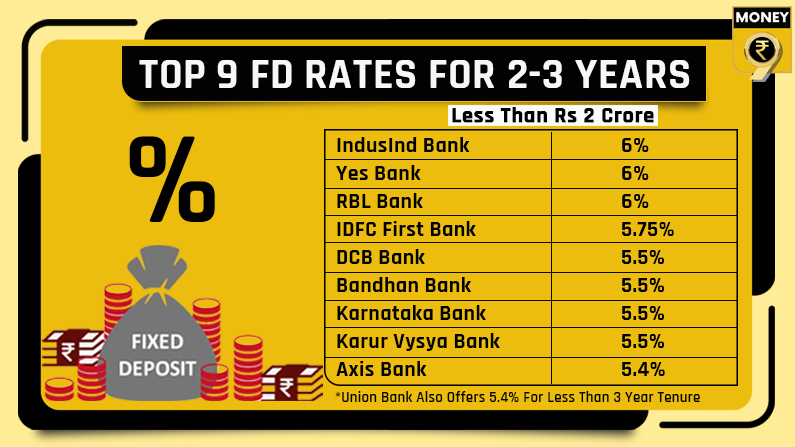Under three-year FDs: Check the best rates from top-9 banks
Fixed deposits: Some private lenders are offering better FD rates across all tenures and also for less-than-36 months.
- Ankur Sengupta
- Last Updated : October 4, 2021, 18:03 IST

Fixed deposits (FDs) are considered a safe and predictable bet to grow one’s money be it is in short term, medium term or long term. Despite the declining rates of interest, a huge number of people still trust bank FDs with their money. But there are still some banks that offer relatively high interest rates than the big ones. Investment just below 36 months or three years still attracts somewhat better interest rate. Some banks offer 6% interest rate for tenure of less than three-year FD. Experts describe this tenure as medium-term that is suitable for smart planning and also meet the need for emergency money.
Money9 gives you the best nine FD rates of less than three years offered by commercial banks, except small finance banks.
Private banks lead
Some private lenders are offering better FD rates across all tenures and also for less-than-36 months. The better rates generally vary between 6% and 5.5%.
The best rate is offered by three leading private lenders IndusInd Bank, Yes Bank and RBL Bank. They offer 6% interest rate for less than 36 months tenure.
The next in the pecking order is IDFC First Bank that offers 5.75% interest rate, followed by DCB Bank, Bandhan Bank, Karnataka Bank and Karur Vysya Bank. They all offer flat 5.5% interest on two-three-year tenures.

The next best interest rates are offered by public sector Union Bank which is 5.4%. Major private sector lender Axis Bank too offers this rate.
Popular lenders
But if we go through the rates of the bigger public sector banks and private lenders, the interest rate is a bit low. The rate is between 5% and 5.15% for less-than-36-month tenure.
The largest lender SBI offers 5.1% for 36 months tenure while PNB and BoB both offer 5.1% for this tenure.
On the other hand, if you go through the leading private lenders then HDFC offers 5.15% for less-than-36-month tenure. ICICI and Kotak Mahindra Bank offer 5.15% and 5% for the same period.
Expert view
“While investing, one must remember that returns are always linked with the risk associated with the investment. With higher returns come higher risks and lower returns with low risk. Ideally the exposure in one bank should be restricted to Rs 5 lakh as this amount is insured under the deposit insurance program of DICGC,” said Arvind Agarwal, a tax expert based in Kolkata.
Download Money9 App for the latest updates on Personal Finance.
Related
- ICICI बैंक को 49.11 करोड़ रुपये के टैक्स डिमांड का मिला नोटिस
- बैंक कर्ज वृद्धि धीमी पड़कर 4.9 प्रतिशत पर: आरबीआई
- PSU के लिए शेयर बाजार से हटने को स्वैच्छिक ढांचा लाएगा SEBI, एफपीआई नियम होंगे सरल
- केनरा बैंक ने सभी बचत खातों में न्यूनतम शेष पर जुर्माने को खत्म किया
- SBI ने FD पर ब्याज दर में 0.20 प्रतिशत की कटौती की
- बैंक ऑफ महाराष्ट्र ने रिटेल लोन दरों में 0.25 प्रतिशत की कटौती की

